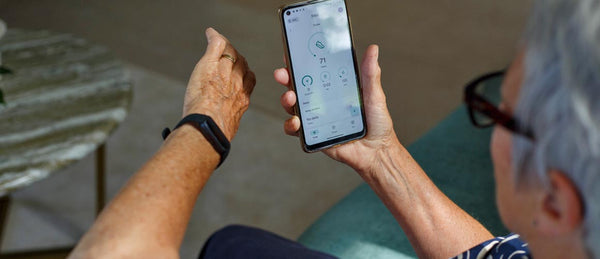Our latest customer insight survey reveals the top concerns that older adults have and how this influences their decision to get a personal alarm. It’s clear that one key factor stands out: living alone.
Key findings
- 82% of personal alarm users live alone, making independence one of the primary triggers for considering a personal alarm or fall alarm.
- 58% of personal alarm users say concerns about living alone are the main reason for choosing a personal alarm, followed by health issues, mobility and fear of falling.
- 88% said having a personal alarm reduced their concerns about living alone and feeling vulnerable.
- 88% also reported their personal alarm provided peace of mind for their family.
- Interestingly, 79% of personal alarm users already have a mobile phone for calling friends and family, yet felt this wasn’t a reliable way to call for help in an emergency, prompting them to purchase an alarm.

The loneliness factor
Living alone in later life can bring more than just practical challenges, it's also correlates with loneliness and vulnerability.
"It’s not just about safety. For many of the people we speak to, it’s the sense of being on their own that weighs most heavily."
Lauren Frake
Taking Care Customer Services Manager
According to the Office of National Statistics, 3.3 million people aged 65 years and over were living alone in England and Wales in 2021. Research by Age UK found that 270,000 older people (aged 65+) in England go a week without speaking to a friend or family member, while findings from the NHS suggests this could be as long as a month.
Health risks tied to chronic loneliness include a significantly increased risk of heart disease, stroke, dementia and reduced life expectancy, which is comparable to smoking 15 cigarettes a day.
Clearly, loneliness is a huge problem for the older population, but personal alarms are helping to tackle the issue, with 88% of customers feeling that their concerns about living alone and feeling vulnerable are reduced due to their personal alarm.
The survey highlights that 88% of family members feel more assured when their older relatives have an alarm. This speaks volumes about the life-saving service’s emotional benefits, offering not only personal safety but also reducing anxiety for carers and family alike.
Why a mobile phone isn’t enough
It's striking that nearly 80% of personal alarm users already own a mobile phone, yet opt for a personal alarm over a mobile phone for emergencies, and for clear reasons:
- Immediate response: Alarms connect quickly to a dedicated Emergency Response Team, without having to unlock a mobile or call contacts who may be unavailable or unable to answer the call.
- Ease of use: A simple pendant or wrist-worn button is far easier to use, especially during falls or medical emergencies when reaching for a phone may be difficult.
- Built-in safety feature: Many alarms include fall detection and GPS tracking, features not standard on mobile phones.
While mobile phones are useful for day-to-day communication, they simply don’t offer the same reliability, accessibility or speed in an emergency as a personal alarm. For many older people, especially those living alone, a personal alarm provides that extra layer of safety and reassurance that a mobile phone alone cannot.

Our survey highlights a clear truth: for many older people, especially those living alone, a personal alarm is more than just a device, it’s a lifeline. It offers practical protection, emotional reassurance and a stronger sense of independence.
"Many of our customers just want to feel safe without always turning to family. The personal alarm means they can keep their independence - and their family can relax, knowing help is always close by."
Lauren Frake
Taking Care Customer Services Manager
As our population continues to age, solutions like personal alarms will play an increasingly vital role in helping people stay safe, connected and confident in their own homes.
Compare personal alarms from Taking Care
Find out more about the different types of elderly alarms and how personal alarms work.






